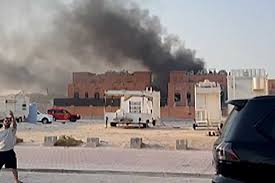The fact that the word tzaros in the phrase ra’os rabbos vitzaros – “many evils and troubles” (Devarim, 31:21) can mean not only “evils” but also “complementary” (for instance, as a description of the relationship of two wives of the same man – who are called tzaros) is seen as meaningful by Rav, in Chagiga 5a.
He explained that the Torah is predicting a time when some evils can be “complementary,” in the sense that addressing one will exacerbate the other, and vice versa.
The metaphor he cites is someone stung in the same place by both a hornet and a scorpion. The former sting’s pain is alleviated by a cold compress and intensified by a hot one; the latter’s, alleviated by a hot compress and intensified by a cold one. What can the stung person do? Whatever he chooses to do will leave him in greater pain.
To our anguish, we live in such times. The mortal danger that is Hamas, which is pledged to destroy the Jewish presence in our land, can only be “treated” by its utter destruction. And yet, seeing that goal to fruition is impossible without attacking the genocidal group’s forces, which are routinely embedded in hospitals and mosques, and among civilians.
Which means exacerbating world opinion, which chooses to see only the tragic but necessary wages of the war against Hamas and to ignore the terrorists’ declared goal.
We Jews in the U.S. are experiencing hornet and scorpion stings of our own. The polarization of American society leaves us with the impossible choice of supporting a political movement that largely has embraced us and Israel, which choice brands us as adversaries in the eyes of those who oppose that movement’s antidemocratic tendencies. And if we declare our fealty to the democratic institutions that have undergirded our security and prosperity for so long, we alienate those who have most strongly championed our rights and Israel’s.
To Americans who value respect for the rule of law and political propriety, the MAGA world is a dire threat. To the MAGA world, those upholders of law and liberal (in the best sense of the word) values are the hazard.
And Jews, who have always actively participated in the democratic system and who seek both security and respect for law and propriety, are viewed suspiciously by both camps. And utterly despised by the fringe of each.
We pray for the Divine intervention that alone can alleviate the pain born of galus.
© 2025 Rabbi Avi Shafran









